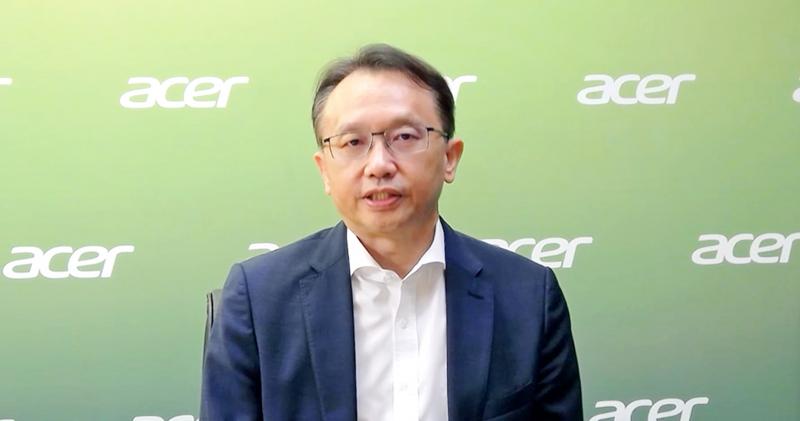PC vendor Acer Inc (宏碁) yesterday said that lockdowns in China to control COVID-19 upended key component supply and disrupted PC production, although chip shortages have been improving.
While chip supply constraints largely eased in the first quarter, the company faces uneven supplies of key components due to COVID-19 restrictions in China, Acer chairman and CEO Jason Chen (陳俊聖) told an online news conference.
“Semiconductor shortage was the biggest problem in the first half of last year,” Chen said. “Now, we are beset by a supply chain issue caused by China's lockdowns.”

Photo: Screenshot from the Internet
With key components unable to be delivered and backing up in warehouses, notebook computer makers have had to halt production, Chen said, adding that a full reopening, and not gradual steps, would be the only way to resume production.
Inventory has increased to about twice its normal levels due to port gridlocks, he said, adding that channel inventory has recovered to pre-pandemic levels.
“Supply and demand balance is a task we have been trying to achieve. There is a great deal of difficulty in doing it right,” Chen said.
Acer experienced a significant decline in revenue about two years ago, as it did not have sufficient inventory to satisfy sudden demand due to the work-from-home and remote learning trends, he said.
Acer now has sufficient raw materials and finished goods in stock, he said.
Demand is weakening as the war in Ukraine has stoked fears over inflation and an economic slowdown, Chen said, adding that lower household disposable income is affecting PC sales.
Worldwide PC shipments fell 3 percent annually to 118.1 million units in the first quarter, Canalys data showed.
However, commercial PCs and green PCs are growing, despite the industry downtrend, as enterprises are purchasing computers for employees returning to offices, he said, adding that sales of Acer’s green Vero PC series expanded 6 percent month-on-month last month.
Acer expects back-to-school demand and the Christmas holiday to bolster demand, Chen said, adding that new 3D technology should also stimulate PC demand.
The company yesterday launched seven new PC series including green PC series, Vero PCs, with chassis utilizing 30 percent post-consumer recycled (PCR) plastics that help reduce 21 percent in carbon emissions. The computer’s screen bezel uses 30 percent PCR plastics and the keycap uses 50 percent PCR plastics.

Intel Corp chief executive officer Lip-Bu Tan (陳立武) is expected to meet with Taiwanese suppliers next month in conjunction with the opening of the Computex Taipei trade show, supply chain sources said on Monday. The visit, the first for Tan to Taiwan since assuming his new post last month, would be aimed at enhancing Intel’s ties with suppliers in Taiwan as he attempts to help turn around the struggling US chipmaker, the sources said. Tan is to hold a banquet to celebrate Intel’s 40-year presence in Taiwan before Computex opens on May 20 and invite dozens of Taiwanese suppliers to exchange views

Application-specific integrated circuit designer Faraday Technology Corp (智原) yesterday said that although revenue this quarter would decline 30 percent from last quarter, it retained its full-year forecast of revenue growth of 100 percent. The company attributed the quarterly drop to a slowdown in customers’ production of chips using Faraday’s advanced packaging technology. The company is still confident about its revenue growth this year, given its strong “design-win” — or the projects it won to help customers design their chips, Faraday president Steve Wang (王國雍) told an online earnings conference. “The design-win this year is better than we expected. We believe we will win

Chizuko Kimura has become the first female sushi chef in the world to win a Michelin star, fulfilling a promise she made to her dying husband to continue his legacy. The 54-year-old Japanese chef regained the Michelin star her late husband, Shunei Kimura, won three years ago for their Sushi Shunei restaurant in Paris. For Shunei Kimura, the star was a dream come true. However, the joy was short-lived. He died from cancer just three months later in June 2022. He was 65. The following year, the restaurant in the heart of Montmartre lost its star rating. Chizuko Kimura insisted that the new star is still down

While China’s leaders use their economic and political might to fight US President Donald Trump’s trade war “to the end,” its army of social media soldiers are embarking on a more humorous campaign online. Trump’s tariff blitz has seen Washington and Beijing impose eye-watering duties on imports from the other, fanning a standoff between the economic superpowers that has sparked global recession fears and sent markets into a tailspin. Trump says his policy is a response to years of being “ripped off” by other countries and aims to bring manufacturing to the US, forcing companies to employ US workers. However, China’s online warriors